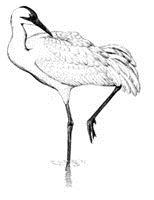North American Crane Working Group

Proceedings of the North American Crane Workshop
Date of this Version
1992
Document Type
Article
Citation
Goodpasture, C., G. Seluja, and G.Gee. Karyotype and identification of sex in two endangered crane species. In: Wood D. A., ed. 1992. Proceedings 1988 North American Crane Workshop, Feb. 22–24, 1988. Lake Wales, Florida (Tallahassee, FL: State of Florida Game and Fresh Water Fish Commission Nongame Wildlife Program Technical Report #12, 1992), pp. 219-224.
Abstract
A laboratory procedure for sex identification of monomorphic birds was developed using modern cytological methods of detecting chromosome abnormalities in human amniotic fluid samples. A pin feather is taken from a pre-fledging bird for tissue culture and karyotype analysis. Through this method, the sex was identified and the karyotype described of the whooping crane (Grus americana) and the Mississippi sandhill crane (G. canadensis pulla). Giemsa-stained karyotypes of these species showed an identical chromosome constitution with 2n = 78 ± 2. However, differences in the amount of centromeric heterochromatin were observed in the Mississippi sandhill crane when compared to the whooping crane C-banded karyotype.
Included in
Behavior and Ethology Commons, Biodiversity Commons, Ornithology Commons, Population Biology Commons, Terrestrial and Aquatic Ecology Commons


Comments
Used by permission of the North American Crane Working Group.